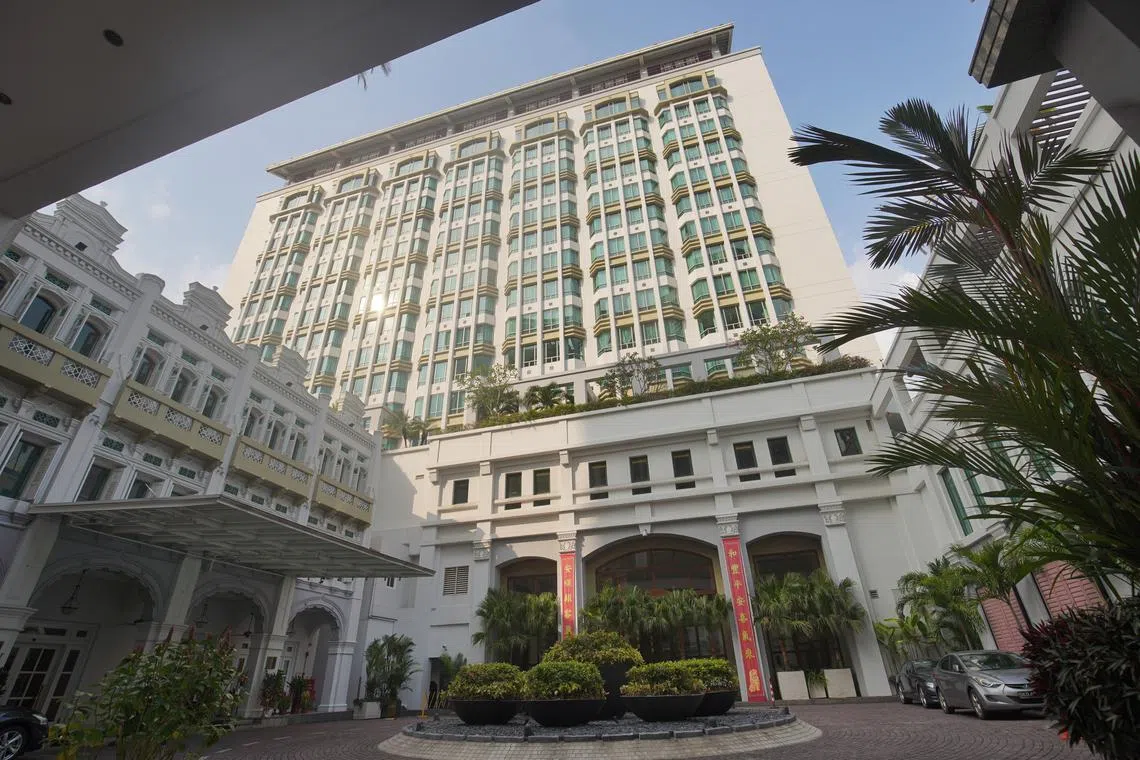Rain on me: InterContinental Singapore hotel offers free night to guests with rained-out plans
Sign up now: Get ST's newsletters delivered to your inbox

The offer by InterContinental Singapore will be available to guests until Dec 31.
PHOTO: LIANHE ZAOBAO FILE
SINGAPORE – Rain can disrupt plans, especially when you are on a holiday with an itinerary full of places to visit and things to do.
A five-star hotel in Singapore has recently offered to turn those frowns upside down with a new package that offers certain guests a voucher if their plans are cancelled due to rain.
Through InterContinental Singapore hotel’s new Rain Resist Bliss package, launched on March 1, some guests will automatically receive a voucher that is worth a one-night stay, if their plans are disrupted by the rain during their stay.
The package will be available until Dec 31.
While the new offering comes with conditions, it has already received coverage by travel writers globally, including those from CNN, Sky News and New York Post.
Mr Andreas Kraemer, the hotel’s general manager, said the idea for the package came about while brainstorming with friends about what could be next in luxury travel.
“One of them jokingly commented that being able to guarantee good weather would be the next level of ultimate luxury travel,” he added.
“While we may not be able to control the weather, we can still help guests be in control of their plans when they stay with this package.”
Not all the hotel’s patrons would fall under the umbrella of this new package, though.
According to the hotel’s website, guests who stay in its five types of suites can opt in for the package without paying extra fees.
Rainfall data from the National Environment Agency (NEA) is used to automatically decide whether guests are eligible for the vouchers, said an InterContinental Singapore spokesman in response to queries.
Guests need not show their planned itinerary to claim the vouchers.
“Claims are triggered when the rain duration exceeds 120 cumulative minutes within any four-hour block of time between 8am and 7pm,” said the spokesman.
For example, if it rains from 4 to 5.30pm, and again from 6 to 6.30pm, a voucher will be given, the spokesman added.
The voucher is credited seven days after the weather data has been published, and has to be used within six months from the date it is issued.
Earlier in March, the Meteorological Service Singapore forecasted moderate to heavy thundery showers over many areas of Singapore
In the second week, localised, short showers are expected over parts of the island on some afternoons.
Although the package was made available only recently, it has “captured people’s attention” and “had a lot of interest surrounding it”, said the hotel’s spokesman. The hotel did not share the number of vouchers that have been claimed.
Such a package would give guests “peace of mind” when they choose to stay at the hotel, given the heavy rain and unpredictable weather in Singapore lately, said Mr Joshua Loh, course chair for Ngee Ann Polytechnic’s diploma in tourism and resort management.
“With the keen competition in the luxury hotel space, such a package shows innovative thinking and can help the hotel stand out among its competitors,” he added. “Using objective data provided by a credible source like NEA as criteria to award the rebate vouchers also provides greater clarity to guests and may help to avoid potential disputes.”
While such a package can create some buzz for the hotel in a crowded and competitive industry, its thunder may be stolen by other factors that a visitor will consider when choosing a place to stay, said other marketing and hospitality experts.
These include price, location, amenities and an increasing attention to sustainable practices, said Dr Seshan Ramaswami, associate professor of marketing education at the Singapore Management University.
He added that the package might benefit only a small fraction of consumers in practice, as it has been “crafted very carefully” such that it might rarely have to be used – citing the numerous conditions that need to be met, such as the “expensive” suites guests need to stay in, and the minimum two hours of rain in a four-hour period during the day, after guests check in.
Another condition that might impact the package’s effectiveness is that guests might not be able to use the free night during their stay, but rather a rebate voucher that has to be used within six months, said Mr Benjamin Cassim, senior lecturer of diploma in hospitality and tourism management at Temasek Polytechnic.
“The assumption is that the guest will have to return to Singapore within the six-month period to utilise the rebate voucher,” he said.



